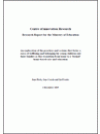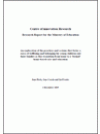This report describes the Centre of Innovation (COI) action research project carried out by Hutt Family Day Care (HFDC) in Lower Hutt, Wellington from January 2006 to end of 2007. Hutt Family Day Care is a privately owned home-based network established in 1999. It comprises eighteen educators working from their homes which are located between Petone and Upper Hutt. Educators provide care and education services for 55 children. Two full time co-ordinators and one who is part-time support the network.
The project aims to fill a gap in the literature in regard to the nature of the transitions that occur for young children and their family as they move from home to early childhood service, in this instance to a home-based context. It is grounded in the view that transitions are dynamic and ongoing and are experienced by everyone involved in the home-based education and care arrangement. This includes the child, the parent(s), the educator, the educators’ family, other children at the educators’ home and the co-ordinators. Parents and children are learning about the people and things in the educator’s home and everyone there is learning about the new family and making adjustments as they do so. The project also presupposed that the relationship building that happens during transitions between home and the service sets the scene for facilitating the child’s trust in his or her educator as well as developing the child’s sense of identity in the new place
Purpose
The question being explored in this report is:
"What is the nature of the practices and systems that foster a sense of wellbeing and belonging for young children and their families as they transition from home to ‘formal’ home-based care and education settings?"
Key Results
- Respectful relationships, within which time is taken for parents and educators to get to know each other and share information, help facilitate the seamless transition of young children from home to home-based care and education settings.
- Trusting relationships sit at the core of effective transition processes for young children and their families.
- Parents are an integral part of the transition process. In home-based care it is important to focus equally on the transition of both parents and children.
- Continuity and linkages between home and home-based settings are important. While ‘continuity’ is an elusive concept in the research literature which requires further exploration, the evidence from the study suggests that the ‘matching’ process implemented by Hutt Family Day Care and the oversight provided by co-ordinators are important factors in ensuring continuity for children and their parents as they move from their home to home-based educator’s setting.
- The entry of new families to a home-based setting involves a community of participants, all of whom have a direct link to that setting and educator. Because of the small group size of participating children (4 at any one time) the entry of a new family has an influence on all those connected to the setting, both adults and children. Systems and processes therefore need to comprehensively accommodate all parties to the arrangement.
- Transition in home-based care is potentially across multiple sites. While the initial focus is on entry to the home-based setting, attention also needs to be paid to strategies which foster the wellbeing of children as they navigate multiple sites of education and care during a week, with their educator and other children; for example, attendance at network playgroups or playcentre.


